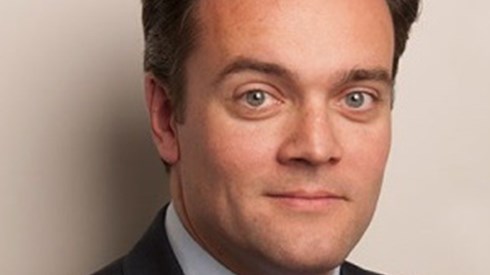James Twining: Captive Insurance Person of Interest

June 19, 2019

As part of our ongoing commitment to provide thoughtful commentary concerning issues impacting captives and the broader insurance markets, we spoke with James Twining, who serves as CEO of Kingsbridge Group, a UK-based commercial insurance broker. Below, Mr. Twining discusses Lloyd's, Brexit, and InsurTech.
James, for our US readers, please provide a brief outline of your background and how you came to specialize in the insurance market?
Like many people in the industry, I came to it somewhat by accident, having started my career in investment banking, before founding a venture capital-backed software start-up and then working as a consultant in McKinsey & Co.'s financial services practice. My move into insurance came when I was hired by JLT as its group strategy director, eventually progressing to be group commercial director and on the main board.
Please talk about your current position as CEO of Kingsbridge and what the company does.
I am currently the CEO of the Kingsbridge Group, a private equity-backed commercial lines broker that has grown to become the United Kingdom's leading provider of insurance and tax services to contractors and freelancers and was named as the 2018 Independent Broker of the Year.
We first spoke with you several years ago regarding an article you had written on Lloyd's . Can you provide your current perspective on Lloyd's and where you see it headed?
Lloyd's is in a much better place than it was a few years ago. The new leadership team has injected a real sense of drive and delivery. Long-overdue action is being taken to re-mediate under-performing lines of business and syndicates. Progress is now being made in terms of electronic placement. Steps are being taken to improve some of the more questionable aspects of the market's culture. Central costs have been cut. The recently published Future at Lloyd's prospectus sets out an encouraging and exciting forward vision.
Even so, this is a dangerous time for Lloyd's. We are perhaps five quarters into a hardening (but not yet hard) market. The risk, therefore, is that rising prices encourage the market to back off further reform (amazing how money can paper over the cracks!) when in truth it needs to redouble its efforts to drive down its costs and invest.
Otherwise, this may well come to be seen as the market's "Kodak moment." Kodak, of course, famously invented the digital camera but then totally misjudged the market's changing needs and failing to build on its early success and momentum. Lloyd's must be careful not to fall into the same trap.
Many US-based captive insurers have relationships with Lloyd's. What advice would you give them in light of your views expressed in our previous question?
The United States is critical to Lloyd's, representing around 50 percent of its gross written premium. The risk to the market is that the high cost of transacting in Lloyd's (with Lloyd's own CEO estimating that it suffers a 9 percent cost disadvantage versus alternative markets) eventually drives this business elsewhere.
US clients, including captives, therefore have a vital role to play in encouraging the market to continue along its current path but also to help guard against the potential unintended consequences of reform.
For example, managing out under-performing lines of business and syndicates is one thing. But the drive to raise standards and protect the Central Fund raises the risk of innovation and entrepreneurial risk taking being stifled. Would Cuthbert Heath have gotten the first excess of loss contract past today's Franchise Board, I wonder? Almost certainly not.
Given the latest developments with Prime Minister May stepping down, how do you foresee the Brexit issue playing out?
If the past few years have shown anything, it is that when it comes to Brexit, no one knows anything! Much will depend on who takes over and whether he or she can deliver where Theresa May struggled.
My personal view is that the European Union will not reopen negotiations. Nor do I think that a second referendum is likely. So that only leaves three options: we take the deal already on the table, we leave without a deal, or we don't leave at all.
It is clear that Parliament will not sanction a no-deal exit. So my guess would be that we end up either taking the deal we already have or we defer our exit (again) and hold a general election where the electoral success of the different parties is likely to be driven by their position on Brexit, which will then determine what happens next.
But then I’m almost certainly wrong!
As a corollary to the prior question, how will all of this impact the financial services industry and particularly insurance in London?
In the short term, the uncertainty created by the current political situation is clearly unhelpful as it undermines investment and confidence in the whole economy, including financial services.
Over the longer term, however, I am far more positive about the prospects for the financial services industry and its ability to innovate and adapt and grow, whatever the outcome. Insurance, in particular, remains exceptionally well placed, given London's unique position as the world's most important insurance hub and as home to an unrivaled ecosystem of talent and services.
Brexit, while disruptive in the short term, has to be viewed against the backdrop of a market that has survived over 300 years of fires, floods, earthquakes, hurricanes, heists, oil spills, terrorist attacks, shipwrecks, diseases, and world wars.
A far bigger challenge to the market is whether it can reform its working practices and cost structure to reflect the changing needs of the modern world and ensure its continued relevance.
Kingsbridge is involved in the InsurTech market. Recently, I heard a speaker say that where InsurTech was originally viewed as a disrupter of the traditional insurance markets, it now is more likely to be a strategic partner with traditional players. Your thoughts?
Our subsidiary, Dinghy (www.getdinghy.com) provides flexible professional indemnity (PI), public liability, cyber, and business equipment cover to freelancers, contractors, and the gig economy. Customers can be on cover in 90 seconds, can register up to 5 separate professions (a common challenge for freelancers or gig workers with traditional insurers), and are billed monthly in arrears based on their actual (per-second) usage, which they manage via a dedicated app. No one else in the PI market does this or even comes close. That is the disruptive power of InsurTech.
However, all the smart technology in the world doesn't make up for "old-fashioned" things like customers and a brand! What many InsurTech companies have come to realize is that building the technology is the easy (and cheaper) part of the equation. Winning customers and financing the huge acquisition cost involved in breaking into a market—that is where the battle is being fought and (increasingly frequently) lost.
There is a parallel here to the biotech market, where start-ups have developed innovative new treatments and then often partnered (or sold themselves) to one of the majors in order to finance the huge costs involved in clinical trials and distribution. In a sense, the biotech industry has therefore acted as a form of outsourced research and development function for Big Pharma. I see the same thing happening in the InsurTech world, and that has certainly been behind our acquisition of Dinghy.
It is also worth remembering that most of the investment into InsurTech to date has been on the distribution side. That is understandable—it is perhaps more tangible and easier to see how current poor user journeys and outcomes can be hugely improved upon. However, 60–70 percent of an insurer's costs are in its own internal expenses, underwriting, and claims management. That is arguably where the bigger opportunity for InsurTech lies, and success here necessarily depends on collaboration with incumbents.
We are going to be speaking with Aaron Koch of Milliman about the insurance-linked securities markets next month. How do you see the alternative capital markets impacting insurance, especially in the United Kingdom and Europe?
In 2002, there was $5 billion of third-party capital in the market. Today it's $18 billion. Many have dismissed this as a short-term reaction to low interest rates and that a few bad losses would chase it away. But the reality is that that has not happened. Despite the losses of the past few years, it has proved to be pretty resilient and in my view is here to stay (and, if anything, get even larger as it expands the risk classes it is able and willing to play in).
At one level, this is good news. It is positive for the market that there is interest in it and that it has been able to attract new capital. However, the challenge is that there is no doubt that it has acted as a huge drag on pricing as the market remains painfully overcapitalized.
The net effect of this capital overhang is that while the underlying cyclical nature of the industry has clearly not changed—or we would not be seeing today's rising prices—the cycle will lengthen and flatten. In other words, the distance between peak and trough will be far narrower than in the past, the time intervals between each peak much longer, and the speed with which prices readjust back down following a huge event (or series of large events) much faster.
Looking forward 10 years, do you see any major evolutions in insurance?
One thing is for sure: when people visit the floor at Lloyd's, it will be as part of a museum tour, not to sit in a queue at a box, doing the crossword, while you wait for an underwriter to physically stamp your slip!
More fundamentally, though, I would see the market evolving in the following four main ways.
- Far greater use of data and analytics to price risk and improve underwriting, operating, and claims efficiency
- The collapse of the value chain—it is simply not sustainable for a US risk to be paying commission to a US broker, a US wholesaler, a Lloyd's broker, and then possibly a reinsurance broker; there are simply too many snouts in the trough, most of whom are not adding any real value
- A shift from tangible- to intangible-based insurance, as company balance sheets evolve from being made up of 80 percent tangible risks (people/plant, etc.) to 80 percent intangible risks (brand, customer data, intellectual property, supply chain, etc.); this is a major challenge (and opportunity) for the market, given the struggle to price these sorts of risks
- The growing importance of Asia, in particular China, as the global economy shifts East in line with the huge predicted growth of those markets
Any closing comments you would like to make to our readers?
I have never known the market to be as active and interesting as it is right now. New companies are being set up; other companies are being sold. People are moving around. Private equity is as active as it has ever been. The traditional value chain is blurring as companies play up and down it or try to turn it completely on its head. InsurTech is shaking things up even further. New products are being developed, old ones reinvented. Has there ever been such a good time to be active in the space?
James, thanks for your time and willingness to speak with us.
James Twining was appointed as chief executive officer of the Kingsbridge Group in September 2017. Previously, Mr. Twining was a main board director and the group commercial director of JLT Group PLC, having joined from McKinsey & Co., where he was an associate principal in its financial services and risk practices. His career started in investment banking at UBS, before he left to set up a procurement software business backed by 3i and GE Capital.
(Article photo of Mr. Twining is provided courtesy of the Kingsbridge Group.)
June 19, 2019

